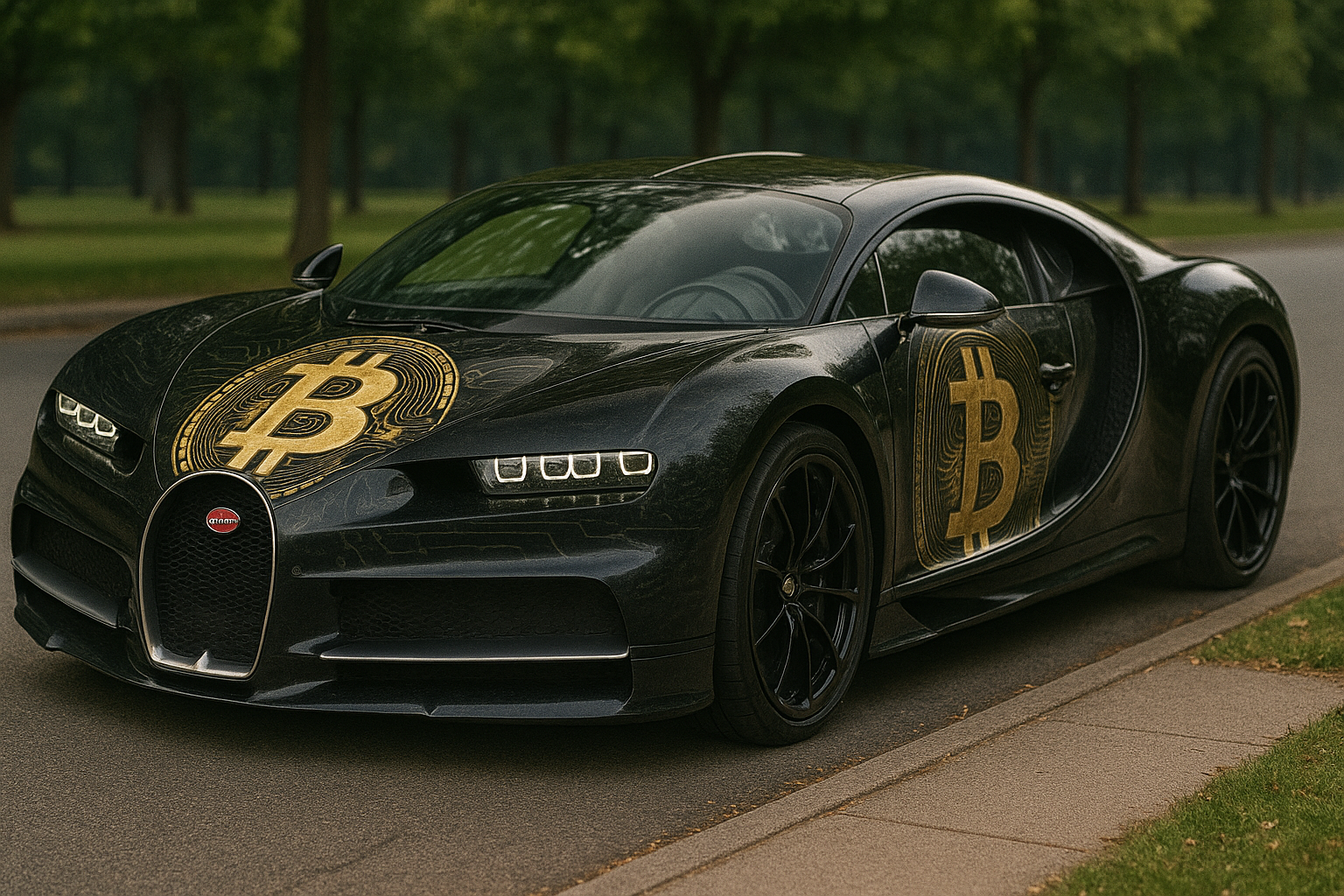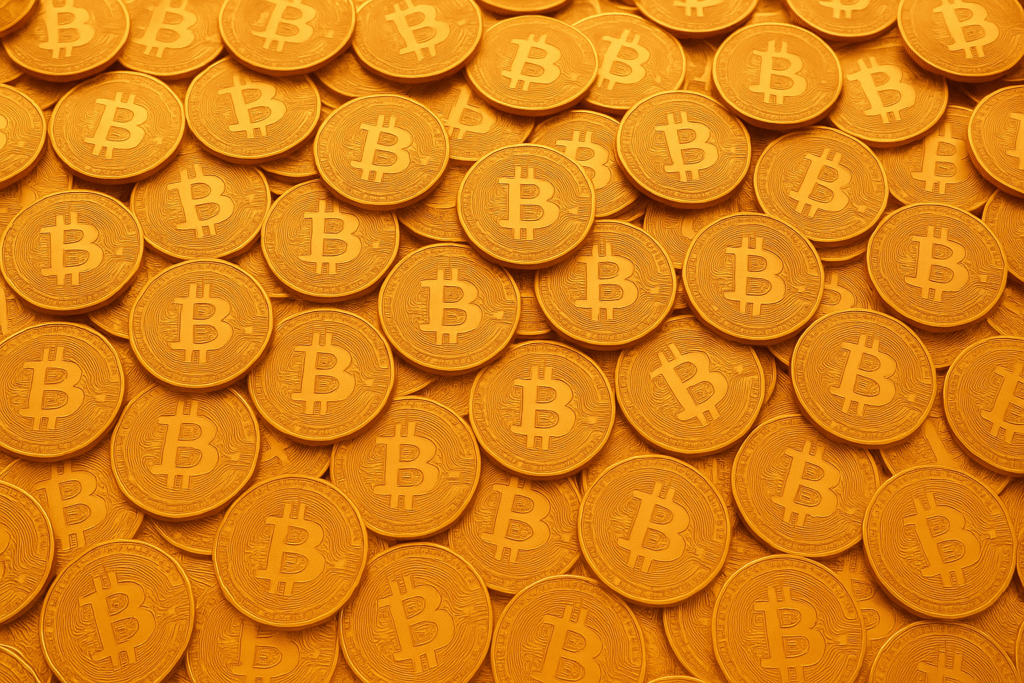Here are 15 concise key points:
-
Buying cars with Bitcoin is possible but limited.
-
Luxury brands like Tesla and Lamborghini often accept Bitcoin.
-
Dealership acceptance depends on location and policy.
-
Direct Bitcoin payments are possible at select dealerships.
-
Crypto payment processors (e.g., BitPay) simplify transactions.
-
Private sales should use secure escrow services.
-
Bitcoin purchases may trigger capital gains taxes.
-
Regulations vary significantly by region; verify locally.
-
Bitcoin transactions must comply with AML/KYC laws.
-
Volatility can impact final transaction values.
-
Fixed-rate agreements help manage Bitcoin price changes.
-
Bitcoin adoption expands customer base and brand visibility.
-
Transaction fees with Bitcoin are often lower.
-
Training staff on Bitcoin transactions is essential.
-
Cryptocurrency adoption in car sales is expected to grow.
Buying Cars with Bitcoin: Is It Actually Possible?
With the increasing adoption of cryptocurrencies, especially Bitcoin (BTC), a frequently asked question among crypto enthusiasts and potential buyers alike is, “Can I actually buy a car with Bitcoin?” The short answer is yes—but, as you might expect, there’s much more to it. The availability of this purchasing option depends heavily on your location, the dealership policies, and various legal and financial considerations.
While Bitcoin adoption continues to grow rapidly, not every dealership or car seller is equipped to handle crypto transactions. But major car dealers, luxury brands, and even private sellers are increasingly embracing Bitcoin payments. Companies like Tesla famously announced accepting Bitcoin payments in early 2021 before briefly suspending them¹. Despite Tesla’s policy shifts, numerous other dealerships—such as HGreg in North America and Prestige Cars Kent in the UK—accept Bitcoin directly on select luxury models².
How Exactly Does Buying a Car with Bitcoin Work?
Purchasing a vehicle with Bitcoin can happen in several ways. Here are the most common options available today:
Direct Bitcoin Payment to Dealership
Many dealerships directly accept Bitcoin as payment. This typically involves the following steps:
-
Confirm Bitcoin Acceptance: First, verify explicitly whether the dealership clearly accepts Bitcoin payments and if any special conditions apply.
-
Negotiating Price in Fiat Currency: Usually, the car price will initially be set in your local currency, such as USD, EUR, or GBP. Upon agreement, the dealership converts this amount into Bitcoin at the current exchange rate.
-
Performing the Transfer: You then transfer the exact Bitcoin amount directly from your cryptocurrency wallet to the dealership’s designated Bitcoin address. This address is typically provided as a QR code for convenience.
-
Transaction Verification and Completion: The dealership confirms the Bitcoin transfer on the blockchain network. Once verified, the paperwork is completed, and the car officially becomes yours.
Using a Crypto Payment Processor
If a dealership doesn’t directly accept Bitcoin, many are still open to receiving it indirectly through third-party payment processors such as BitPay or Coinbase Commerce³. You send Bitcoin to the processor, which instantly converts it into fiat currency at the current exchange rate; the dealership receives the funds in local currency, streamlining the purchase.
Buying from Private Sellers Using Bitcoin
You can also purchase a car directly from a private seller using Bitcoin, which involves additional trust and safety precautions:
-
Verify Seller Trustworthiness: It’s essential to confirm the credibility of the private seller. Using secure escrow services that support cryptocurrency transactions is strongly recommended.
-
Negotiate and Agree Clearly: Ensure both parties clearly understand and explicitly agree on the transaction terms, including who covers transfer fees and how the Bitcoin exchange rate will be determined.
-
Escrow Service: Using a trusted escrow platform, transfer your Bitcoin. After confirming receipt of the car in good condition, the escrow service releases the Bitcoin to the seller.
Legal Considerations: Can You Legally Buy a Car with Bitcoin?
While it’s generally legal to buy a car with Bitcoin in many countries—such as the United States, Canada, UK, Germany, Australia, and Japan—specific rules vary based on regulatory frameworks governing cryptocurrency transactions⁴. In some jurisdictions with ambiguous or restrictive crypto policies, reporting requirements or limits may apply. Always explicitly verify the local legal context and consider consulting financial or legal professionals to ensure full compliance.
Which Major Automotive Brands and Dealerships Accept Bitcoin?
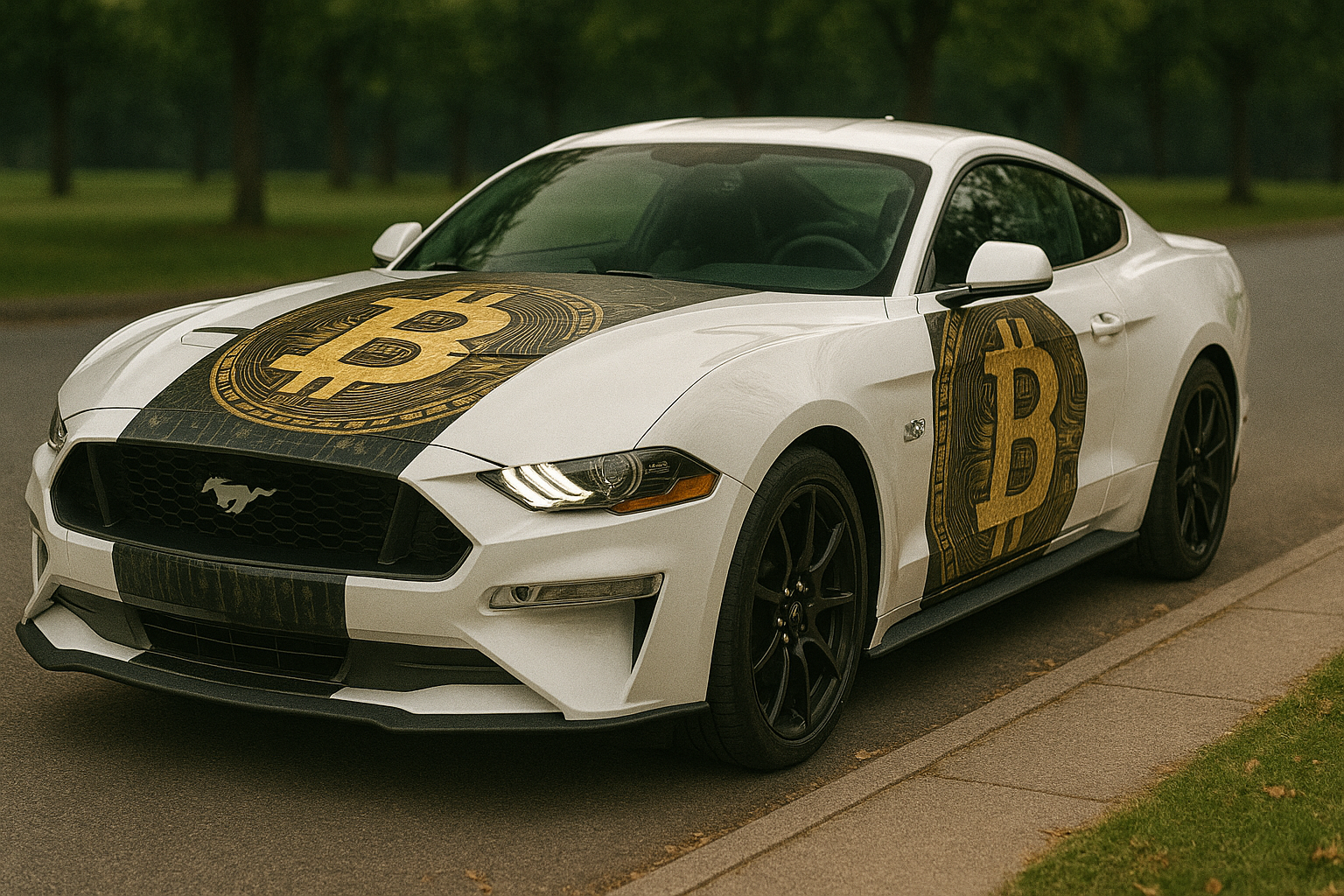
Today, an increasing number of car dealerships and automotive brands worldwide actively accept Bitcoin payments. The acceptance of Bitcoin is especially prevalent in the luxury car market, where crypto-savvy customers and innovative dealerships often intersect. Brands like Lamborghini, Porsche, and BMW are regularly sold by dealerships that explicitly accept Bitcoin transactions, especially in major financial centers such as London, New York, Miami, and Dubai⁵.
In addition to luxury cars, mainstream brands like Tesla have made headlines for their adoption of Bitcoin. Though Tesla briefly halted Bitcoin payments due to environmental concerns, CEO Elon Musk publicly stated that the company would likely resume accepting Bitcoin payments once renewable energy usage in Bitcoin mining increases sufficiently⁶.
Prominent dealerships explicitly accepting Bitcoin globally include AutoCoinCars in the UK, BitCars in Europe, and Post Oak Motor Cars in the United States. These dealerships don’t just accept Bitcoin; they actively market their services directly to cryptocurrency users, highlighting the ease and speed of crypto-based purchases⁷.
Step-by-Step: How to Securely Buy a Car Using Bitcoin
Successfully purchasing a car with Bitcoin involves several explicit steps designed to ensure security, compliance, and clarity for both buyers and sellers:
Step 1: Confirm the Dealer’s Cryptocurrency Policy
The first critical step is explicitly confirming the dealership’s policy on cryptocurrency payments. Verify their willingness to accept Bitcoin, understand the exact payment process, and explicitly agree on the exchange rate calculation method used to determine the final Bitcoin price⁸.
Step 2: Perform Due Diligence and Identity Verification
Many dealerships that accept Bitcoin payments must comply with Know Your Customer (KYC) and Anti-Money Laundering (AML) laws. Prepare the required documentation, such as identification, proof of residency, and financial information explicitly required by the dealer or payment processor⁹.
Step 3: Agree on Final Pricing and Transaction Fees
Once you’ve selected your car and confirmed acceptance of Bitcoin, clearly negotiate and agree on the final purchase price. Explicitly confirm whether any additional transaction fees or network charges will apply and determine who is responsible for covering these costs.
Step 4: Conduct a Secure Bitcoin Transaction
Always perform Bitcoin transactions using secure, verified cryptocurrency wallets. Send the exact agreed-upon amount of Bitcoin to the dealership’s provided address. Use a wallet that provides detailed transaction confirmations, enhancing transparency and security.
Step 5: Verify the Transaction
Both you and the dealership should explicitly verify the Bitcoin transaction using blockchain confirmations. It typically takes around 10–30 minutes for a transaction to be fully confirmed. Once verified, proceed immediately with the necessary paperwork and ownership transfer.
Common Pitfalls and Risks When Buying Cars with Bitcoin
While buying a car with Bitcoin has clear benefits, several pitfalls exist:
-
Exchange Rate Volatility: Bitcoin prices can fluctuate significantly, even during short transaction windows. Dealers and buyers should explicitly agree on how to handle any sudden changes in exchange rates.
-
Regulatory Compliance Issues: Failing to comply explicitly with local regulations can result in legal complications. Ensure thorough research and professional consultation before conducting the transaction.
-
Scams and Fraud: Unfortunately, cryptocurrency transactions attract fraudsters. Use secure, well-known platforms and verify dealers thoroughly before proceeding with payments.
Taxation Implications of Buying a Car with Bitcoin
Using Bitcoin to buy a car typically carries clear tax implications that buyers must explicitly understand:
-
In jurisdictions like the United States, Canada, and most European countries, Bitcoin transactions are considered taxable events. This means if the value of your Bitcoin has appreciated significantly since you acquired it, using Bitcoin to purchase a car could result in capital gains taxes.
-
Buyers should explicitly document every transaction detail—dates, exchange rates, and Bitcoin values—to ensure accurate tax reporting. Consulting a tax professional or accountant experienced in cryptocurrency transactions is highly advisable to avoid compliance issues.
Regional Regulations and Legal Considerations for Bitcoin Car Purchases
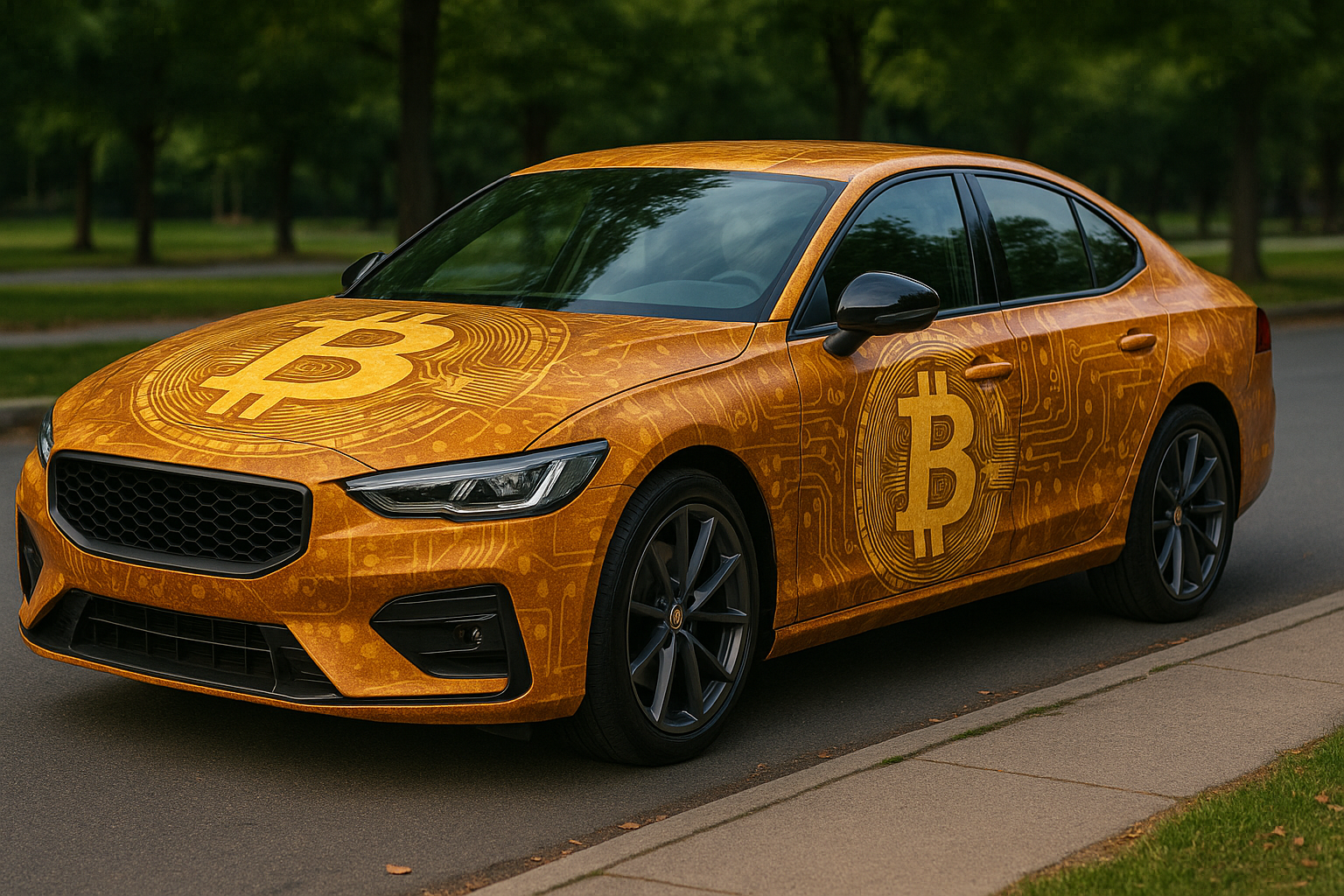
When considering buying a car with Bitcoin, it’s essential to be explicitly aware of regional regulations and legal frameworks, as these can differ significantly across various jurisdictions worldwide. Understanding these regulations not only ensures compliance but also protects buyers and sellers from potential legal complications.
North America (United States and Canada)
In the United States, purchasing a car with Bitcoin is entirely legal, provided transactions are properly reported to the Internal Revenue Service (IRS)¹⁰. Bitcoin transactions are treated as property exchanges for tax purposes, meaning any gain or loss must be explicitly documented. Additionally, dealerships accepting Bitcoin need to comply strictly with Anti-Money Laundering (AML) and Know Your Customer (KYC) regulations enforced by the Financial Crimes Enforcement Network (FinCEN)¹¹.
Similarly, Canada allows Bitcoin purchases for vehicles explicitly. Transactions must adhere strictly to regulations outlined by the Financial Transactions and Reports Analysis Centre of Canada (FINTRAC)¹², ensuring proper identity verification and record-keeping.
Europe (EU and UK)
Within the European Union, cryptocurrency regulations vary slightly by country, but Bitcoin car purchases remain explicitly legal across the region. The European Central Bank (ECB) and the European Banking Authority (EBA) require crypto payment platforms and dealerships to adhere strictly to Anti-Money Laundering directives (5AMLD and 6AMLD)¹³. This ensures clear buyer and seller identification and transaction transparency.
In the United Kingdom, the Financial Conduct Authority (FCA) explicitly regulates cryptocurrency transactions, including car purchases. Dealers accepting Bitcoin must register explicitly with the FCA and comply with rigorous AML/KYC standards¹⁴. For buyers, documenting transactions thoroughly helps ensure compliance with HM Revenue and Customs (HMRC), especially for capital gains reporting purposes.
Asia (Japan, Singapore, and UAE)
In Japan, purchasing cars with Bitcoin is explicitly permitted, with clearly defined regulations. Japan’s Financial Services Agency (FSA) regulates cryptocurrency exchanges and transactions stringently¹⁵. Compliance with AML/KYC regulations is mandatory for all dealerships and payment platforms accepting Bitcoin.
Singapore explicitly recognizes Bitcoin transactions as legal and regulated. The Monetary Authority of Singapore (MAS) provides detailed guidelines for dealerships and crypto platforms, emphasizing thorough customer identity verification and clear transaction reporting¹⁶.
The United Arab Emirates (UAE), particularly in Dubai, explicitly allows cryptocurrency transactions for luxury goods like cars, regulated under the Virtual Assets Regulatory Authority (VARA)¹⁷. Dealers accepting Bitcoin payments must comply explicitly with VARA’s licensing and customer identification requirements.
Secure Platforms and Escrow Services for Bitcoin Car Purchases
Ensuring secure Bitcoin car purchases explicitly involves using trusted platforms and escrow services. These platforms significantly reduce risks associated with fraud and enhance transaction security:
BitPay
A widely recognized cryptocurrency payment processor explicitly used by dealerships to accept Bitcoin. BitPay instantly converts Bitcoin into fiat currency, streamlining the purchase process and offering enhanced security¹⁸.
Escaroo
A secure, blockchain-based escrow service explicitly designed to facilitate cryptocurrency transactions for high-value items, including cars¹⁹.
Crypto Exchange Platforms (e.g., Coinbase, Binance)
Many dealerships utilize reputable cryptocurrency exchanges explicitly as payment gateways. These exchanges adhere to strict regulatory standards and provide buyers explicit transactional transparency and security²⁰.
Real-World Case Studies of Successful Bitcoin Car Purchases
Real-world examples explicitly demonstrate Bitcoin’s practicality in vehicle transactions. Notable cases include:
Tesla’s Early Bitcoin Adoption
Tesla famously sold cars explicitly using Bitcoin in early 2021, paving the way for widespread dealership acceptance globally²¹.
Post Oak Motor Cars
A Houston-based luxury dealership that explicitly began accepting Bitcoin, successfully selling high-end vehicles including Bentleys and Rolls-Royces to crypto investors²².
BitCars Europe
Explicitly specializing in luxury car sales via cryptocurrency, BitCars has successfully facilitated Bitcoin transactions across Europe, demonstrating clear proof-of-concept and broadening the market’s acceptance²³.
Advanced Strategies for Managing Bitcoin Price Volatility During Car Transactions
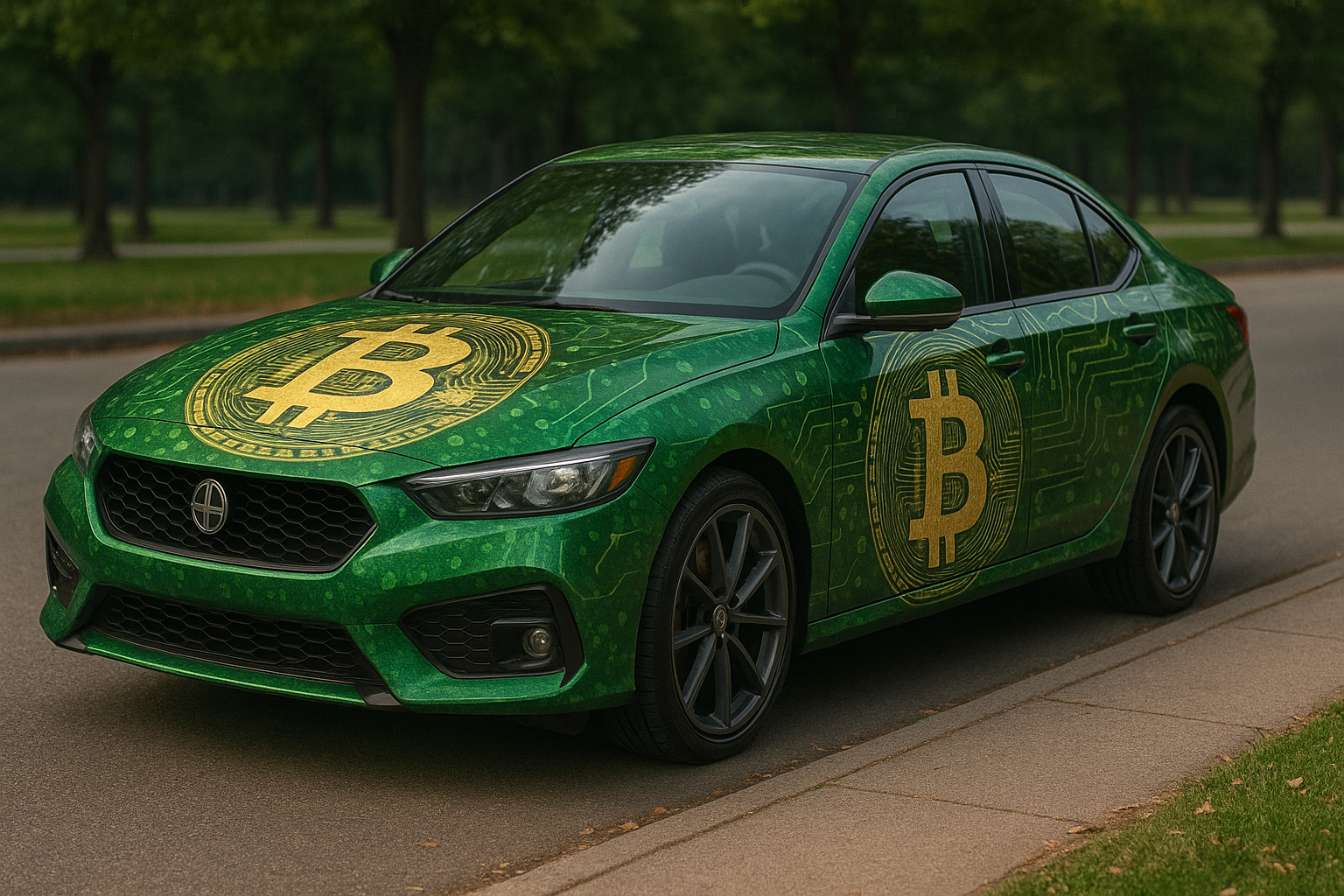
Bitcoin’s value volatility is a significant consideration when purchasing a car, particularly when dealing with high-value transactions. Even short-term price fluctuations can affect transaction finality, leading to either buyers paying more than intended or dealerships receiving less than expected. Thankfully, several advanced strategies can help manage and minimize these risks explicitly:
Strategy 1: Fixed Exchange Rate Agreements
One straightforward method dealerships and buyers use is setting a fixed exchange rate explicitly at the moment of agreement. This ensures that the Bitcoin price at the time of negotiation is the price used for the final transaction. Payment must be completed within a specific timeframe—typically 24 to 48 hours—to avoid significant price shifts. This explicit agreement protects both parties against unexpected volatility and potential disputes²⁴.
Strategy 2: Using Third‑Party Payment Processors
Dealerships frequently use established third-party payment processors, such as BitPay, Coinbase Commerce, or OpenNode, explicitly to mitigate volatility. These processors lock in the Bitcoin-to-fiat exchange rate immediately at checkout, converting cryptocurrency instantly into local currency. Buyers know precisely how much Bitcoin they must send, and sellers confidently receive the agreed-upon fiat amount, eliminating volatility concerns explicitly from both sides²⁵.
Strategy 3: Bitcoin Futures and Hedging Contracts
More advanced dealerships or high-volume car sellers may employ explicit financial tools such as Bitcoin futures contracts or options to hedge against price fluctuations. These financial instruments allow dealerships explicitly to lock in future Bitcoin prices, offsetting potential losses caused by volatility. However, using these financial instruments typically requires significant financial expertise and adherence explicitly to financial regulatory guidelines²⁶.
Long-Term Benefits of Explicit Bitcoin Adoption for Car Dealerships
Dealerships explicitly adopting Bitcoin payments enjoy several significant long-term benefits:
Increased Customer Reach
Explicitly accepting Bitcoin attracts a broader, more tech-savvy audience interested in cryptocurrency transactions. This expanded customer base often leads to increased sales and dealership visibility within cryptocurrency communities²⁷.
Enhanced Brand Image
Explicitly positioning your dealership as forward-thinking and innovative, accepting Bitcoin payments can positively differentiate you from competitors. It signifies adaptability and modernity explicitly to potential customers²⁸.
Lower Transaction Costs
Explicitly using cryptocurrency transactions generally incurs lower fees than traditional credit card or bank payments, reducing transaction costs for dealerships significantly²⁹.
Simplified International Sales
Bitcoin explicitly facilitates easier international transactions, minimizing delays and costly currency conversions, making your dealership appealing to international buyers³⁰.
Considerations for Car Dealerships Explicitly Adopting Bitcoin
Despite the clear benefits, explicit adoption of Bitcoin payments requires dealerships to consider several crucial factors:
Compliance and Regulation
Explicit adherence to local AML/KYC laws and cryptocurrency regulations is essential to avoid potential legal penalties³¹.
Training and Support
Dealership staff need explicit training and ongoing support to handle Bitcoin transactions smoothly and securely³².
Security Measures
Explicitly implementing robust cybersecurity measures to protect Bitcoin wallets and customer data is paramount. Ensuring secure wallet management practices significantly reduces the risk of theft or hacking³³.
Future Predictions for Bitcoin and Cryptocurrency in Automotive Transactions
Looking toward the future, Bitcoin and other cryptocurrencies will likely see broader adoption explicitly within the automotive sector. Industry experts predict the following trends explicitly:
Mainstream Adoption Increase
More major car manufacturers and dealerships will explicitly begin accepting Bitcoin and other cryptocurrencies, driven by customer demand and technological advancements³⁴.
Stablecoin Usage Rise
Dealerships may increasingly utilize stablecoins (cryptocurrencies pegged explicitly to stable fiat currencies) to avoid volatility, enabling secure, predictable, and efficient transactions.
Blockchain Integration in Car Transactions
Blockchain technology, underpinning cryptocurrencies explicitly, may streamline various aspects of car purchasing, including secure documentation, title transfers, and vehicle histories, further boosting cryptocurrency’s practical usage in automotive industries³⁵.
These predictions indicate a promising future for cryptocurrency explicitly in car sales, offering both dealerships and consumers new opportunities to innovate and streamline automotive transactions.
Final Thoughts and Next Steps
Cryptocurrency explicitly represents a significant evolution in automotive transactions. Whether you’re a buyer or dealership, explicitly understanding cryptocurrency’s benefits, risks, and strategies ensures secure, efficient, and innovative car transactions. Explicitly adopting careful practices, keeping updated with regulations, and using proven platforms will help you successfully navigate this exciting market.
Disclaimer
This article is provided for educational purposes only. Always explicitly verify legality, taxes, and specific transaction details with professionals before completing cryptocurrency transactions.
References
- https://www.reuters.com/business/autos-transportation/tesla-will-most-likely-restart-accepting-bitcoin-payments-says-musk-2021-07-21
- https://cointelegraph.com/news/how-to-buy-a-car-with-bitcoin-btc-in-2025
- https://www.bitpay.com/blog/how-to-buy-a-car-with-bitcoin?utm_source=chatgpt.com
- https://en.wikipedia.org/wiki/Legality_of_cryptocurrency_by_country_or_territory
- https://pickuptrucktalk.com/2025/04/car-manufacturers-that-accept-and-invest-in-cryptocurrencies/
- https://cryptoemporium.com/automotive/cars/tesla/
- https://www.postoakmotors.com/
- https://www.fincen.gov/sites/default/files/2024-crypto-compliance-advisory.pdf
- https://www.fatf-gafi.org/recommendations.html
- https://www.irs.gov/filing/digital-assets
- https://www.fincen.gov/sites/default/files/2024-12/Alert-FinCEN-Scams-FINAL508.pdf
- https://fintrac-canafe.canada.ca/guidance-directives/transaction-operation/lvctr/lvctr-eng
- https://www.fca.org.uk/firms/cryptoassets-information
- https://www.fca.org.uk/publication/consultation/cp25-14.pdf
- https://www.fsa.go.jp/en/newsletter/weekly2024/584.html
- https://www.mas.gov.sg/news/media-releases/2025/mas-clarifies-regulatory-regime-for-digital-token-service-providers
- https://rulebooks.vara.ae/entiresection/14
- https://www.bitpay.com/business
- https://cointelegraph.com/explained/what-are-bitcoin-escrow-services-and-how-do-they-work
- https://commerce.coinbase.com/
- https://blockworks.co/news/musk-tesla-likely-to-resume-bitcoin-payment-system
- https://cointelegraph.com/news/bentley-bugatti-rolls-royce-retailer-announces-its-now-accepting-bitcoin
- https://nowpayments.io/blog/car-dealers-accepting-bitcoin
- https://www.finextra.com/newsarticle/39812/merchants-lock-crypto-prices-in-real-time-to-manage-volatility
- https://crustlab.com/blog/how-a-crypto-payment-gateway-works/
- https://corytech.com/crypto-insights/crypto-processing-enterprises
- https://www.forbes.com/councils/forbestechcouncil/2024/08/09/driving-the-future-how-the-blockchain-is-revolutionizing-the-automotive-industry/
- https://hbr.org/2025/01/using-blockchain-to-build-customer-trust-in-ai
- https://www.weforum.org/stories/2024/05/global-cryptocurrency-regulations-changing/
- https://paymentsconsulting.com/reshaping-cross-border-payments-with-stablecoins/
- https://www.coindesk.com/policy/2021/10/28/fatf-crypto-guidance-looks-to-bring-industry-in-line-with-banks
- https://velocityglobal.com/resources/blog/how-to-pay-employees-in-crypto/
- https://www.mckinsey.com/industries/financial-services/our-insights/from-ripples-to-waves-the-transformational-power-of-tokenizing-assets
- https://www.fsb.org/work-of-the-fsb/financial-innovation-and-structural-change/crypto-assets-and-global-stablecoins/
- https://documents1.worldbank.org/curated/en/099200503082329768/pdf/P17425408f3aa00580a2620810813ed0370.pdf

